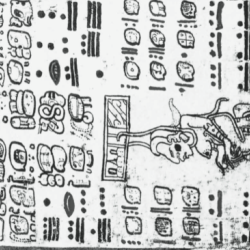Source Institutions
Source Institutions
Add to list Go to activity
Activity link broken? See if it's at the internet archive

This is a lesson plan for an activity in which learners, playing the role of archeologists, use math concepts about number bases to decipher the Dresden Codex, an ancient Mayan document. The lesson provides learners with historical background and exposure to how archeologists figure out what ancient documents mean. It also helps learners compare Mayan number systems (base 5) and modern number systems (base 10). It then leads them step-by-step through a series of activies to help break the code, with stopping points to discuss and investigate different ideas. In order to do this activity, learners should understand place value and number bases. Recommended for grade 5 and up.
- Under 5 minutes
- 2 to 4 hours
- 1 cent - $1 per group of students
- Ages 8 - adult
- Activity, Lesson/Lesson Plan
- English
Quick Guide
Materials List (per group of students)
- Mayan codex (on page 2 of PDF)
- Calculator (optional, but recommended)
Subjects
-
Earth and Space Science
- Astronomy
-
Earth, Moon and Sun
- Days
-
Mathematics
-
Algebra
- Patterns
-
Data Analysis and Probability
- Data Collection
- Data Representation
-
Measurement
- Units of Measurement
-
Number and Operations
- Number Systems
- Representation
-
Algebra
-
The Nature of Technology
-
The Design Process
- Problem Solving
-
The Design Process
- The Nature of Science
Informal Categories
- Historical Reenactment
Audience
To use this activity, learners need to:
- see
- read
Learning styles supported:
- Links STEM to other topics of interest such as arts and humanities
- Involves hands-on or lab activities
Other
Components that are part of this resource:
Includes alignment to state and/or national standards:
This resource is part of:
Access Rights:
- Free access
By:
- Bazin, Maurice ; Tamez, Modesto ; Teacher Institute, The Exploratorium
Source Collection
- Science After School Consumer's Guide
Rights:
- All rights reserved, Exploratorium, 2002
